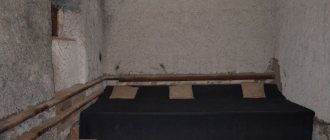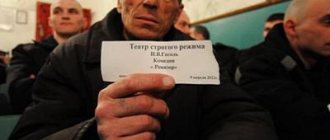What is quarantine in prison and pre-trial detention center?
Initially, you should understand the fundamental concepts that will subsequently be used in the article. A place of deprivation of liberty is understood as a secure facility created and functioning for the execution of a sentence imposed by a court.
Quarantine in prison is a medical examination of an arriving accused or already convicted citizen.
There are several types of such places: educational colonies, correctional institutions of various regimes and, directly, prisons. A pre-trial detention center is understood as a place of exclusively temporary detention, where citizens who have not yet been convicted (in respect of whom investigative actions are still underway) have the right to stay.
Quarantine in this situation is understood not as a medical term, but as a criminal procedural concept , meaning carrying out certain procedural actions with a citizen who has recently been imprisoned, after which he will be transferred to a permanent cell.
So what is prison quarantine? This is a medical examination of an arriving accused or already convicted citizen . These activities include identifying signs of disease in a citizen. In this case we are talking about diseases that can harm other detainees. This refers to AIDS, tuberculosis, sexually transmitted infectious diseases, etc.
In addition, as part of the quarantine inspection, specific signs of a citizen are identified, for example, scars, tattoos, etc.
Why quarantine upon arrival at a settlement colony?
- Leaving the colony without permission from the colony leadership.
- Prohibition on bringing alcohol and drugs into the territory.
- Prohibition on carrying and storing weapons of any kind.
- Prisoners are not allowed to purchase their own vehicles.
- You cannot buy medications yourself without a doctor's prescription.
So, if it is located within a populated area, then its territory will be fenced and a checkpoint will appear. The first prisons of this type appeared in Soviet Russia in 1963.
Then they belonged to the category of correctional labor colonies and settlements. They provide comprehensive treatment for sick people.
They are all distributed in departments specializing in a specific dangerous disease, which greatly reduces the risk of getting any disease there. During quarantine, a set of procedures takes place, which begin with an examination by a doctor - paramedic. It identifies the primary complaints of the incoming person, measures blood pressure and blood sugar. Takes other tests (stool, urine, blood).
After which a laboratory test is carried out. All recorded information is entered into the patient’s card. A citizen suspected of committing a crime has the right to receive copies of the results of a medical examination, which are certified by the signature of medical personnel and the head of the guard.
The lawyer can attach another copy of the medical certificate to the materials of the case under consideration. Telephone in Moscow and the Moscow region: +7 This division is applied only conditionally, because usually in one colony there may be representatives of both prisoners.
- Check the presence of all convicts who must reside on its territory during curfew and rise.
- Monitor the implementation of work functions during the day , as well as check the life of each living prisoner.
- Control the communication and relationships of convicts in a given territory.
- Suppress and control attempts to deliver prohibited items into the territory.
- Control and create psychological stability for all residents of the colony.
After the bath we were returned to quarantine, where we were forced to write applications to join the SDP. Those who refused were beaten. In the evening I found out that M.I. Trepashkin was given 15 days in a punishment cell, that they found the people who wrote the reports.
In addition, a convict who worked as a food distributor in a punishment cell told me that M. I. Trepashkin was kept in a solitary cell, where the walls were covered with a thick layer of ice. 9.
Upon receipt of a court order, the search department (department) of the territorial body of the Federal Penitentiary Service of Russia opens a search case and carries out the necessary set of operational investigative measures.
Instructions for sending to a colony-settlement those sentenced to imprisonment, in respect of whom the court has made a decision providing for the convicted person to independently proceed to the place of serving the sentence
Finally, the party ends, and the tired convicts can go about their personal affairs.
In another - at the headquarters, in the third - in quarantine. In the fourth - in a punishment cell.
Organization of work with convicts serving sentences in colony settlements
Arrivals must be subjected to a full search , and their belongings must be searched .
List of products allowed for transfer to the colony settlement? Within 24 hours, it is necessary to ensure that the convict undergoes a medical examination, complete sanitary treatment for medical reasons, and is placed in a quarantine department for up to 15 days .
https://www.youtube.com/watch?v=2qtSZwNuC0Y
No later than 10 days after the convict’s arrival at the colony-settlement, a notification is sent to one of his relatives with the address of the institution, indicating a list of food products and essential items that are allowed to be sent in parcels, packages and parcels, as well as the rules for correspondence and receiving visits. , travel and receiving money transfers, the right to telephone conversations.
In order to avoid duplication of ongoing activities, the presence of quarantine in colony settlements for positively characterized convicts transferred from general and strict regime correctional institutions seems inappropriate.
The main criterion here is the presence of a proven system of quarantine measures, previously implemented in the correctional institution from which the convict was transferred to a penal colony.
At the same time, medical personnel, employees of the psychological service, educational work and labor organization of convicts of the sending correctional institution must provide the following information before the arrival of the convict at the colony-settlement: Reception of convicts arriving at the colony-settlement is carried out by the assistant on duty of the head of the colony, an employee of a special department of the institution and representative of a military unit.
How to find out whether a newly arrived convict has left quarantine
These activities include identifying signs of disease in a citizen.
The asset is in quarantine, in the zone. They used to wear red bands. When I was sitting there, there was an official demand to abolish the asset, but in fact it remains.
In this case we are talking about diseases that can harm other detainees. Legal regulation of this action is carried out: - says Sokolov.
Forum – Associations of wives and relatives of prisoners
Once, in the same Kaliningrad, after quarantine (as he said), they threw a certain guy into our cell, who bent his fingers, explained everything according to concepts, talked about how he had a great time during his previous tour, how he was respected in the zone, like the cops he was broken when he was received, etc. He didn’t stay with us for long, about a week, and he didn’t get along well - no one got close to him at all, no one really listened to him, maybe only a little kid - he was a bad talker. Then he disappeared.
Under Catherine II, who invested a lot of effort in improving the penal system, many prisons were created. Some of them are still in use today. Also, under Catherine II, a detailed and very progressive “Draft of Regulations on Prisons” was created.
Quarantine also provides for the administration to get to know its new client. In quarantine, there is almost certainly an informer available to listen to what the newly minted prisoners are talking about.
Most of them are still in a state of high agitation and agitation, and for many this manifests itself in uncontrollable verbal diarrhea. Later, when a person gets used to it and comes to his senses, it will be much more difficult to recruit him for the necessary information than now, in the first days.
During my stay in quarantine, they do several medical tests - in Russia I was given RW (syphilis), HIV infection, fluorography (tuberculosis). In Ukraine, as I heard, they don’t do HIV. In the Kaliningrad prison, unlike many others, they take the issue of quarantine seriously - no less than 10 days and no earlier than the tests are ready.
But there, however, in the city and, accordingly, in the prison, there are countless people infected with HIV - such a record-breaking city, so the guys have to be on the alert.
But be that as it may, having realized for yourself that the situation is not very good, you should not lose heart and make yourself a sharpener for opening veins or, conversely, have your head in the clouds and dream of early release or the sudden intercession of a powerful patron.
In prison there is no room for either despair or fruitless hopes. To survive, you need to rely only on your own strength.
What is a colony-settlement
In settlement colonies there is no punishment as such. These institutions are very reminiscent of a regular shift in the woodworking industry. Taking a convicted person to a settlement colony to serve his sentence? Here is a certain area consisting of people engaged in a common cause.
There are practically no supervisors, there is no total control on the part of management. The only restrictions characteristic of these institutions are to check the ability of prisoners to lead a normal lifestyle, that is, without antisocial behavior and exceeding the limits of what is permitted.
There is no clear classification of detention regimes in settlement colonies. However, disciplinary sanctions may be applied to violators of the existing rules, one of which is a ban on leaving the hostel outside working hours for up to 30 days.
Another significant role of settlement colonies for a country is to provide cheap labor for the mining industry. Not many people agree to go to the wilds of Siberia to work in the woodworking industry. Compensating for the shortage of workers at the expense of convicts has a positive effect on the country’s economy as a whole.
The lack of choice among prisoners and their need to earn money allows the employer (in this case the state) to dictate their terms. The described division is arbitrary, and cases are acceptable when individuals classified as both types can serve sentences in the same institution.
- Low-maintenance settlements. Those who have committed crimes through negligence or due to circumstances (affect, pressure from third parties, etc.) are sent to them. They are also intended for those who committed crimes with intent, but the severity is not higher than average.
- Settlements intended for prisoners serving sentences in general or strict regime colonies, who have earned their good behavior to mitigate the preventive measure. Typically, such institutions have increased security measures.
Dating in a settlement colony
At the request of the convicted person, visits can be replaced by a telephone conversation, and long visits can be replaced by short-term ones; in the educational colony there is also a long-term visit with accommodation outside the correctional institution - short-term with exit from the colony. Long-term visits are not provided to those in medical institutions, they are replaced by short-term ones.
Convicts in strict conditions, in punishment and disciplinary isolation wards, cell-type premises and solitary confinement, may be provided with a telephone conversation only under exceptional personal circumstances.
The duration of visits may be reduced by the administration at the insistence of the persons on the date. Combining dates or splitting one date into several is not allowed. Convicts have the right to telephone conversations (Article 92 of the Penal Code of the Russian Federation).
In the absence of technical capabilities, the number of calls may be limited to six per year. Telephone conversations are monitored by correctional facility staff. During long visits, convicts can use clothes, underwear and shoes brought by relatives.
If the arrivals violate the established procedure for conducting a meeting, it is immediately interrupted. Persons arriving on a meeting with convicts are not allowed to bring any products or things into the short-term visiting rooms.
For long dates, you are allowed to bring food (with the exception of wine, vodka and beer).
Please, who can come on a visit to a convicted person in a settlement colony and what is needed for this? Serving a sentence for leaving his unit without permission. How to get to the penal colony at your place of residence? Hello, my husband is serving time in a penal colony. Today, as usual, I went on a short date with him, but they didn’t let me in! They told me to go to the head of the “village”! What does it mean?
Could something, God forbid, happen to your husband?
Of course it could. A type of correctional institution of the Federal Penitentiary Service, located mainly in wooded areas of the northern and eastern regions of Russia and representing buildings without fences, is called a colony-settlement.
Neglect of the protected perimeter is compensated by the remoteness of such settlements from cities and other significant settlements, representing mining cooperatives engaged primarily in felling and logging.
The measures of influence required to correct the behavior of various criminals are differentiated based on the severity of the consequences of the embodied offense and the presence of intent in the actions that led to negative results.
What is a colony-settlement: conditions of detention, features and regime
Based on the above legal norms, convicts in the settlement:
In a colony-settlement, convicts are kept without guards. There are no towers on which correctional officers stand with machine guns.
Nevertheless, those convicted there are under constant control of the colony administration.
They are allowed to move freely within the territory of this correctional institution, they can carry money with them in order to make purchases in the store at the colony.
Many convicts even wear jewelry, because by law they can have valuables on them.
As a rule, the convict gets to the colony-settlement under his own power after receiving a certain order.
Convicted of quarantine, extortion, etc. ...
He is under the control of the criminal inspectorate until he arrives at the place of serving his sentence.
Everything here is quite clear. Here it is also necessary to say that women’s colony settlements are most often located in general regime correctional institutions for representatives of the fair half of humanity.
There are not many places there, therefore, by court decision, only the most responsible and good production workers, who have almost completely proven their correction in practice, are transferred there for good behavior and a conscientious attitude to work. That's the order.
— carry out labor activities in accordance with the Labor Code (with the exception of choosing the place of their professional activity and dismissal from work);
Read other articles on the site:
What happens during quarantine
Once it has been determined that this is a quarantine in the zone, it is necessary to find out what is happening within it. Legal regulation of this action is carried out:
- Criminal Procedural Code of the Russian Federation.
- Order of the Ministry of Justice regulating the procedure for holding citizens in custody.
- Internal local acts of a pre-trial detention center or correctional institution.
During quarantine, a set of procedures takes place, which begin with an examination by a doctor - paramedic. It identifies the primary complaints of the incoming person, measures blood pressure and blood sugar. Takes other tests (stool, urine, blood). After which a laboratory test is carried out.
In a situation where there are any assumptions about a citizen’s painful condition, he is sent for examination to a specialized specialist. He finds out whether there are reasons for concern. If there are none, then the citizen goes to general places of detention reserved for all other citizens there.
In a situation where a dangerous disease has been identified, there are several options for action. If we are talking about a temporary detention facility, then in such institutions, as a rule, there are no special places for sick people. Only in exceptional cases can they be sent for treatment to a hospital located at a pre-trial detention center.
Attention! In most cases, sick persons are kept together with everyone else. Therefore, in a pre-trial detention center there is always a huge risk of getting serious viral diseases.
If a prisoner is diagnosed with any dangerous disease, then he can be sent for treatment to a hospital located at the pre-trial detention center
If we talk about direct places of deprivation of liberty, then in this situation everything is much better. If diseases are detected, the administration of the institution has the right to petition the court to change the place of serving imprisonment from a correctional institution to a medical correctional institution (medical correctional institution).
They provide comprehensive treatment for sick people. They are all distributed in departments specializing in a specific dangerous disease, which greatly reduces the risk of getting any disease there.
Of course, in reality, quarantine provides for slightly different conditions. Quarantine cells are often overcrowded and completely unsanitary; examinations by doctors are formal. Only airborne diseases are tested. Therefore, some prisoners are simply not treated by the colony's medical services.
What is a colony settlement for convicts?
Colony-settlement: what is it and how do they live there? This is a question that arises among many who face such punishment.
And, indeed, it is not always immediately clear to everyone how this version of punishment differs from other colonies and prisons with different forms of detention.
What is a colony settlement?
What is a colony-settlement for convicts is well described in Russian legislation.
By definition, this is a type of correctional institution in which those sentenced to imprisonment for crimes committed through negligence serve their sentences.
In addition, those who committed a crime for the first time can also end up in a colony-settlement, although only those who belong to the category of minor or moderate severity.
In Russia, such colonies are located mainly in the northern and eastern regions, where there are many forests.
The first prisons of this type appeared in Soviet Russia in 1963. Then they belonged to the category of correctional labor colonies and settlements.
In 2022, as before, in such correctional institutions there are mainly those who:
- Committed a crime through negligence and was sentenced for no more than 5 years.
- Positively characterized during detention and transferred from general and strict regime colonies.
Serving a sentence in a colony-settlement is assigned by the court based on the totality of the severity of the punishment and the evidence . Many are concerned about the question: what are the conditions of detention in such colonies.
What features are there
What is the difference between a general regime colony and a settlement colony is a question of interest to those who face such punishment. As experts note, in essence, living in a colony-settlement is not a punishment at all.
This form of correctional work is more reminiscent of a shift in some wooded area or at wood processing enterprises.
There is no total control on the part of the colony leadership, and there are practically no guards.
In essence, the staff here is needed only to monitor how prisoners are trying to adapt socially, how they can lead a crime-free life, without exceeding the limits of what is permitted and generally accepted.
There are no serious fences in the colony, as a result of which prisoners often have a desire to leave their correctional facility without permission.
However, due to the fact that such colonies are located in forests where there is no transit transport, and without food and water in which there is simply no life, the search for fugitives usually quickly ends in success.
Terms of serving the sentence here
The following conditions apply in the settlement colony:
- The prisoners are not monitored by guards: all prisoners can move freely around the territory of the institution. They are also allowed to visit neighboring settlements, if there are any, and if there is an agreement between the colony and the village.
- There are no restrictions on receiving parcels: however, there is an exception - you cannot bring parcels into the territory of the colony that may contain items that provoke an antisocial lifestyle.
- The uniform is civilian: therefore, to the question: what to take with you to a colony settlement, the answer is simple: the usual style. It is believed that in this way those serving their sentences do not stand out from others, which helps them adapt more easily.
- Colonies are divided into genders: male, female, children.
- The administration can conduct a search at any time: if items that fall into the category of prohibited items are found, sanctions will be applied to the violator, up to and including transfer to a correctional colony.
- Regardless of the financial situation of the convicted person, he must work - it is work that must develop useful habits. All work is carried out in accordance with labor laws.
- In their free time from work, convicts can learn new professions - for this purpose there are educational institutions on the territory of the colony.
You can even live in a colony-settlement with your family. This is possible if the person has proven himself positively. Then he can live with his family in rented premises.
In such a situation, he will have to go to the colony at least 4 times a month and check in.
It is worth considering separately the question: is it possible to use a mobile phone? The answer is quite simple. Despite this freedom, prisoners are not allowed to use communication devices.
What are the boundaries of a colony-settlement?
A colony-settlement must be formalized according to certain rules.
So, if it is located within a populated area, then its territory will be fenced and a checkpoint will appear.
At the same time, only representatives of the administration and the settlers themselves can pass through it freely.
The boundaries depend on the location of the correctional institution - the guideline is a radius of 5 km from the center of the colony.
What should happen in a colony?
If we consider the internal arrangement of a colony-settlement, then within its boundaries there should be everything necessary for the full life of the prisoners.
On the territory there are:
- Outpatient and hospital.
- Dining room.
- Shop.
- Bathhouse.
- School.
- Library.
- Assembly Hall.
- Cinema hall.
Separate conditions are provided for receiving guests - those who come to visit the convicted person.
The administration shift on duty performs certain supervisory functions:
- Finds out the presence of all convicts within the colony in the period of time between lights out and rise.
- Checks their behavior at home and at work.
- Controls personal relationships.
- They stop attempts to deliver prohibited items into the territory of the correctional institution, which are prescribed in the statute of the correctional institution.
- Provide psychological stability.
Responsibilities and restrictions of convicted persons
Naturally, with such a lenient punishment, all convicts have certain responsibilities and may also have their rights limited.
Duties include:
- Requesting permission to leave the correctional facility.
- Obligation to work - you can find a job on your own; prisoners provide all their living needs themselves.
- The need to hand over all your documents upon arrival to the leadership of the colony: everyone is issued a certificate, which replaces a passport and other documents while serving their sentence; it is used for employment, as well as for receiving postal items and even for marriage.
There are also a number of actions that prisoners are not allowed to perform. So, these include:
- Leaving the colony without permission from the colony leadership.
- Prohibition on bringing alcohol and drugs into the territory.
- Prohibition on carrying and storing weapons of any kind.
- Prisoners are not allowed to purchase their own vehicles.
- You cannot buy medications yourself without a doctor's prescription.
How long does quarantine last?
What is quarantine in a colony settlement? This question is often asked by those who are planning to move . Quarantine in correctional institutions is regulated by Part 2 of Article 79 of the Criminal Code.
Convicts who arrive at the place of serving their sentence are quarantined for up to 15 days. During this period, they remain under normal conditions of serving their sentence.
How long does quarantine last?
The Criminal Procedure Code sets a certain period during which quarantine can last. It is equal to fifteen days. When asked how long quarantine in a pre-trial detention center lasts, the legislator gives a similar answer.
Of course, it is not always possible to identify serious diseases in a citizen during this period. In some cases, this period may need to be extended. This is carried out only by written order of the head of the correctional institution and only in exceptional cases.
Sometimes, after the initial examination, a citizen is immediately sent to a cell, thereby not complying with the fifteen-day period. This also risks the fact that many serious diseases may simply go unnoticed.
Correctional colony through the eyes of an employee
30 Hello, Pikabu, in my first post I would like to talk about places of imprisonment by an employee of the Federal Penitentiary Service of Russia.
We recommend reading: What is the amount of alimony paid for the loss of a breadwinner?
I don’t want to overload you with a large number of beeches, so I won’t focus on everything at once; if you show interest, in the future I will reveal all the depths of this topic.
So, in the region of, say, L. there is a correctional colony No., say, 666.
It generally houses convicts with an average sentence of 2-5 years. Repeatedly convicted. The real scum of society are almost all drug addicts, alcoholics, and homeless people.
Their journey begins with the fact that they are brought in a paddy wagon to the institution and are met by the duty shift that is serving at that moment.
There are only 4 shifts, one shift is a security shift - it requires convicts to comply with the regime of detention, does not allow them to escape, we call it “trembling” them.
One shift is “operational”, they don’t so much “chat” the convicts as get them started
Set of procedures
The set of procedures carried out during quarantine is regulated, in addition to the Criminal Procedure Code of the Russian Federation, by internal local acts of the pre-trial detention center. New arrivals fall into the hands of the doctor (paramedic) on duty at the pre-trial detention center.
He asks general questions about your health, listens to complaints, and measures your blood sugar and blood pressure. Takes urine and stool samples for laboratory testing, weighs the prisoner, measures head circumference, and all data is entered into the medical outpatient record.
The prisoner additionally undergoes a fluorographic examination . If a patient complains of a specific illness, he is referred for examination to a specialized specialist, who will find out whether there is cause for concern. In the absence of such, the citizen is transferred to a general place of detention.
If you have suffered beatings or torture, you definitely need to say so, focusing on bruises and abrasions, possible internal bleeding, and rupture of organs. Insist that this information be included in the medical record.
If you come to your senses and try to state during the trial that your testimony was forced out of you, without the appropriate records, your statement is almost always doomed to failure . And getting medical care in prison will be much more difficult. Therefore, immediately demand a copy of the medical examination, which must be signed by the assistant on duty and the chief of guard who delivered the suspect or accused (in accordance with paragraph 16 of the Appendix).
Additionally, you must be asked to provide a written explanation of the circumstances under which you received bodily injuries, and the assistant on duty will be required to report this to the head of the pretrial detention center. Your lawyer may also request a copy of the medical report and attach it to your case file.
If you believe that the medical examination was carried out in violation of your rights and is not complete enough, your lawyer (and you) can insist on an examination by employees of other medical organizations . If the administration refuses to meet you halfway, appeal their actions to the prosecutor or to the court.
The administration of the institution has no desire to take responsibility if a prisoner, for example, dies a couple of days after entering quarantine from bleeding that was not noticed in time. After all, this will mean that he was not treated with due attention.
Some prisoners try to abuse their position, to pretend that they are worse off than they really are. Whether to repeat this or not is a personal matter for everyone, but in case of obvious detachment of the staff, insist on your own, because your health is at stake .
If the tests (for syphilis, HIV, tuberculosis) show a positive result, the patient is sent to a hospital located at the pre-trial detention center.
It is worth mentioning this nuance. According to the Internal Regulations, a personal search of a prisoner is carried out exclusively by pre-trial detention center officers of the same sex . Persons of the opposite sex should not be present. But this does not apply to medical workers - both examination and treatment can be carried out by employees of the opposite sex (clause 28 of the Rules).
The administration of the pre-trial detention center is obliged to ensure the protection of the health and life of the accused and suspects, to comply with sanitary and hygienic requirements for maintaining cleanliness and order in the quarantine room. Some services may be paid: for example, dental prosthetics, the manufacture of special orthopedic shoes, glasses.
The daily routine in quarantine remains the same as in the cells. Every day, the guards at the pre-trial detention center take the prisoners outside, into the common corridor, and count them. Many prisoners recall that the light in the cells was on both day and night without interruption.
Feeding is not carried out in the common canteen: food is delivered to the cells by the guards, and bowls are served through a specially provided “feeding trough” in the door. The website contains information about transfers to the pre-trial detention center and whether it is possible to use the telephone to communicate with loved ones.
Don't buy anything in packages. Bargain
The cost of unofficial services in a pre-trial detention center can be reduced by 15 times by bargaining
An entrepreneur personally familiar with the customs of one of the main Moscow pre-trial detention centers : When I went into quarantine, they immediately told me that I could make myself more comfortable and sit down with other businesses. My cellmates offered me, but apparently someone from the management of the pre-trial detention center showed them the materials of my criminal case - how would they know that I had money if they didn’t see that I was accused of fraud worth tens of millions.
The price of the camera was set at 750,000 rubles. I was lucky to have a lawyer. I knew that this price was a scam. He said that he didn’t do what I was accused of. That I don't have money. And that I will pay as much as I can. We bargained for a long time, but in the end we agreed to 50,000 rubles a month. And another guy still pays 750,000. Another - 250,000. When in the pre-trial detention center they understand that you are guided by prices, they begin to explain that they are selling you all the services in a package. But this is a scam, it doesn’t happen like that. There is no need to buy services in bulk. You need to buy one at a time, as needed. Then there will be fewer problems and questions. Everything will be cheaper, and you won’t be perceived as a cash cow.
What problems of Russian prisons have human rights activists noted?
Meanwhile, from the address of General Moroz it follows that now the reception and detention of suspects and accused persons listed in the investigative and judicial authorities, including in the Moscow region, garrison military courts, as well as the Western, Northwestern, Northern and Northeastern districts of Moscow , will be carried out by pre-trial detention center-12 on Panfilov Street in Zelenograd. This pre-trial detention center (designed for 210 prisoners) and the colony-settlement located on the same territory were transferred to the Moscow Federal Penitentiary Service only in January of this year. The colony, by the way, celebrated its 100th anniversary last year, and arose when prisoners from Moscow began to be sent to the Kryukovo station to collect firewood and peat. In the 70s of the last century, the institution became an exemplary institution, so it was its club that was allocated for the filming of Vasily Shukshin’s feature film “Kalina Krasnaya”.
Nikolay Sergeev, Maria Starikova








